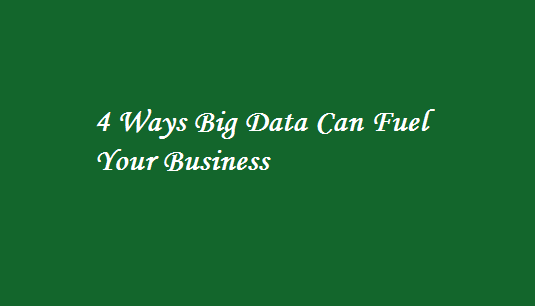
4 Ways Big Data Can Fuel Your Business
Big Data, in the context of business systems, is basically data generated by applications and systems. Its main characteristics are volume, velocity and variety.
To clarify further, ‘volume’ refers to the fact that big data is available in extremely large volumes. Velocity pertains to the enormous speed by which this data is collected and stored.
The scope of big data ranges from personal information, preferences, geographical location, comments, to browsing patterns, and lot more depicting the ‘variety’ of it.
Big data, nowadays, is largely being mined and analysed effectively to draw useful conclusions for business decision making. This process, called big data analytics aids businesses in decision making. It is also a very big leap towards achieving business intelligence.
Many confuse big data with businesses intelligence, but big data can rather be perceived as a raw material for business intelligence.
Major sources of big data for businesses include media, web, cloud, databases etc. All businesses nowadays have access to almost all of these. Through internet, there is no scarcity of regular data availability.
Whether big data can be converted into an asset will depend on the ability of the business to harness it effectively. But, the real achievement is in identifying the areas where big data can be efficiently used to enhance business performance and growth. So, let us look at some of these.
-
Customer responsiveness in showcasing
Big Data can be used to check consumer profile, preferences, comments and feedback. Every business is ultimately dependent on clients. So understanding their choices is the most important step in development of the business.
Based on client or consumer needs, business can adjust its operations and targets. For example, an e-commerce app or website can display, recommend, or suggest products based on the user’s age, gender, location, browsing patterns, and likes etc.
As a consequence, the customer gets a feel of specific attention and the convenience that it adds to the shopping experience would attract him more to this shopping platform.
Also, you can configure the site to display offers and discounts specifically about the user’s products of interest or regarding those which are more popular in the consumer’s vicinity due to cultural, climatic or seasonal effects.
The most widespread use of user preferences and profile data is in advertising. Big data is analyzed and information thus obtained is used to display advertisements specific to the users or prevent those which do not apply to a particular user or segment of users.
-
Online reputation management
Big data is largely a source of feedback about a company’s products and services which helps the company improve quality and identify future growth prospects.
Feedback is the biggest user input for any business as it helps in making improvement plans. Without constant improvements, even the best of businesses can lose credibility and trust among the customers. It can also considerably affect scopes for getting future customers.
Big data, similarly, can also be used to gather insights on the competitor’s reputation. Feedback is one of the determinants of a company’s online reputation and big data can be used for monitoring it.
This can consequently help in gauging the effectiveness of the current or recent brand management and marketing strategies and can act as warnings or reinforcement for deciding future marketing strategies.
-
Process Planning & Management
The anticipation of demand for a product can help businesses in planning for production and service availability.
Big data can give useful insights regarding the demand for an existing product. Based on this, the business can plan increase or decrease of supply of raw material and equip themselves with relevant resources. This also aids in better inventory management of raw material and finished goods.
Production and service availability can be scheduled and budgeted by planning the processes and facilities accordingly to match with the anticipated increase or decrease in demand. Overall, this contributes to building efficient processes and cost reduction.
-
Strategic Decision Making
Big data can have a prominent contribution in making larger business decisions such as expanding product/service range or extending presence in certain cities or areas.
It also aids in deciding features and functionalities in products and services catering to local needs depending on the culture or even climate of that area.
Let us again see it from the perspective of a simple shopping app of a famous clothing brand. Big data obtained through such apps, gives valuable information to the business about the products commonly searched for.
And, now in the era of voice search, a large amount of customer preferences can be collected when the customer searched through it.
This gives them a direction for product range diversification decisions. Appropriate conclusions can be drawn by segregating the sales patterns based on region, gender, income, age group, location or community.
With data obtained this way, businesses can get a better understanding of local trends and products/services preferred in particular times of the year.
Sales forecasting and strategy building has always been a critical area for businesses as their success depends largely on this. Identification of such consumer patterns based on location and time helps in sales forecasting and building the right and specific sales strategies for different zones or countries.
Conclusion
All the achievements of big data can ultimately be attributed to efficient analytics, without which the data is just a collection occupying significant storage spaces. And it actually took business community years to identify the real potential of such data.
Now, with its popular demand, there are a lot of tools and technologies available for big data analytics which can help businesses make wonders using it.